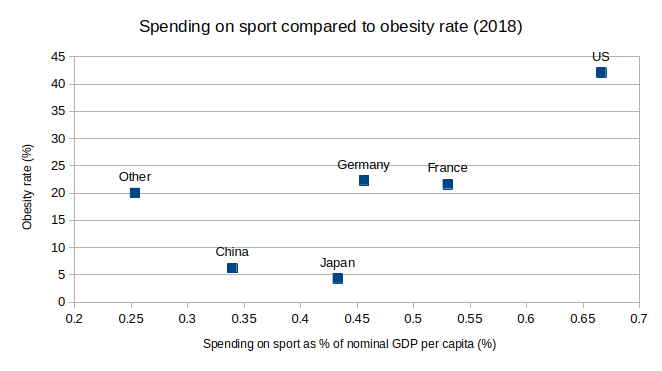As students of elementary statistics learn, correlation does not equal causation. Yet much of the research used to drive policy conflates the two.
For example, sporting participation and good health are positively associated. From this it has been extrapolated that promoting sport will lead to better population health.
It is trivially obvious that people who engage in sports tend to be healthier, because physical activity mostly leads to better health. But physical activity and sport are not identical.
Consider this chart, showing the relationship between spending on sports and obesity rates at a population level (unfortunately Statista charges an exorbitant amount for detailed country stats hence only a few countries are shown). As a country’s general prosperity may affect rates of obesity and sports spending, the chart is adjusted for GDP per person.

Sources:
https://www.statista.com/statistics/1087429/global-sports-market-share-by-country
https://en.wikipedia.org/wiki/List_of_countries_by_GDP_(nominal)
https://en.wikipedia.org/wiki/List_of_countries_by_obesity_rate
https://database.earth/population/by-country/2018
While these data are admittedly crude, they do not suggest that higher spending on sport improves population fitness.
There is, in fact, scant evidence at all that professional sport encourages healthy behaviour, and some evidence suggests it does the exact opposite through sponsorship of unhealthy products. While sports stars are held up as role models, and prominent sporting events may encourage people to take up sports, participation does not last. Children are made to play sports at school during physical education lessons. But this does not seem to encourage lasting participation either, and if anything has the opposite effect. Many children enjoy informal physical games outside school, but lose interest when they become a requirement and their performance is formally ranked.
Why is lasting participation in sport, as opposed to merely watching sport, so low in adults?
With sport there is generally a competitive element, and almost always so with spectator sport. Competition creates winners and losers, with corresponding positive and negative emotions. People who excel at sport tend to be naturally fitter and they tend to continue participating because of the pleasure of performing well. Those who perform poorly at sport tend to be less fit naturally and are less keen to continue due to the displeasure of performing poorly. Even if their team wins, those who aren’t fit tend not to enjoy the experience, may feel shame at their poor performance, and will tend to drop out. Hence any correlation between sport and good health can be explained by reverse causality and survivorship bias. It may be that those who did badly at sport would improve their health if they kept at it, but people don’t like losing. Hence sport promotes health in those already fit and discourages it in those who need exercise most. When competitive sport is virtually synonymous with physical activity, this can lead many into inactive lives, as we are seeing.
